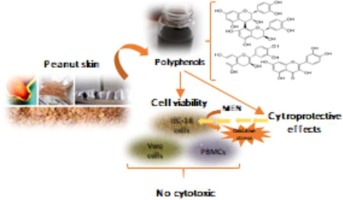Journal of Functional Foods ( IF 3.8 ) Pub Date : 2020-02-25 , DOI: 10.1016/j.jff.2020.103862 Yanina E. Rossi , Luciana P. Bohl , Noelia L. Vanden Braber , María B. Ballatore , Franco M. Escobar , Romina Bodoira , Damián M. Maestri , Carina Porporatto , Lilia R. Cavaglieri , Mariana A. Montenegro

|
Arachis hypogaea L. (peanut) skin is a potential source of natural antioxidants, and several studies have suggested the possibility of producing functional ingredients from this by-product of food industry. This investigation examined possible toxic effects of peanut skin polyphenolic extract (PSE) and its antioxidant properties using in vitro studies. PSE and its main component quercetin (QE) did not present any cytotoxicity on normal epithelial cells, rat ileum cells (IEC-18), monkey kidney cells (Vero) or human peripheral blood mononuclear cells (PBMCs) at concentrations with antioxidant effects. QE and PSE showed scavenging of the superoxide anion radical and cytoprotection, as well as reducing the reactive oxygen species (ROS) and superoxide dismutase (SOD) activity in IEC-18 cells against menadione-induced oxidative stress. This suggests that peanut skin phenolic extract could be a potential functional ingredient for foods.
中文翻译:

花生(Arachis hypogaea L.)皮肤中的多酚可作为正常细胞的生物保护剂。细胞毒性,细胞保护以及与ROS相互作用的研究
花生(花生)皮肤是天然抗氧化剂的潜在来源,一些研究表明,可以从食品工业的这种副产品中生产功能性成分。这项研究使用体外方法检查了花生皮多酚提取物(PSE)的可能毒性作用及其抗氧化性能学习。PSE及其主要成分槲皮素(QE)对正常上皮细胞,大鼠回肠细胞(IEC-18),猴肾细胞(Vero)或人外周血单核细胞(PBMC)均没有任何细胞毒性,且具有抗氧化作用。QE和PSE显示清除过氧化物阴离子自由基和细胞保护作用,并降低IEC-18细胞对甲萘醌诱导的氧化应激的活性氧(ROS)和超氧化物歧化酶(SOD)活性。这表明花生皮酚提取物可能是食品的潜在功能成分。











































 京公网安备 11010802027423号
京公网安备 11010802027423号